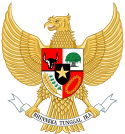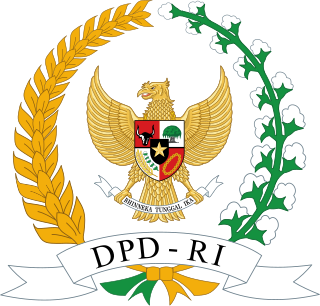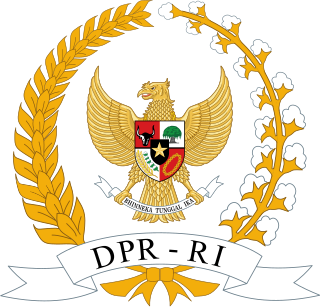
The politics of Indonesia take place in the framework of a presidential representative democratic republic whereby the President of Indonesia is both head of state and head of government and of a multi-party system. Executive power is exercised by the government. Legislative power is vested in both the government and the two People's Representative Councils. The judiciary is independent of the executive and the legislature.

The Indonesian Democratic Party of Struggle is an Indonesian political party, and the party of the current President of Indonesia, Joko Widodo.

The Golkar Party or Party of Functional Groups is a political party in Indonesia. It was founded as Sekber Golkar in 1964, and participated for the first time in 1971 as Golkar. At this point, Golkar was not a political party. In 1999, forced by the new election law, the groups reformed itself as a political party.

The United Development Party is an Islam-based political party in Indonesia. Due to its distinctive logo, the party is nicknamed "Kaaba Party".

Indonesia held legislative elections on 5 April 2004 for both houses of the People's Consultative Assembly, the country's national legislature. This included all 550 seats in the People's Representative Council and 128 seats of the new Regional Representative Council.

Elections in Indonesia have taken place since 1955 to elect a legislature. At a national level, Indonesian people did not elect a head of state – the president – until 2004. Since then, the president is elected for a five-year term, as are the 560-member People's Representative Council and the 128-seat Regional Representative Council.

The Prosperous Justice Party, frequently abbreviated to PKS, is an Islam-based political party in Indonesia.

The National Mandate Party, frequently abbreviated to PAN, is an Islam-based political party in Indonesia.

The Crescent Star Party is a political party in Indonesia.
The Concern for the Nation Functional Party is a political party in Indonesia. The party was established by former members of the Golkar Party who were dissatisfied with Golkar's abandonment of former president Suharto including former minister Hartono and Suharto's daughter Siti Hardiyanti Rukmana. Suharto himself approved the party name.
The Indonesian Justice and Unity Party is a political party in Indonesia.

Presidential elections were held in Indonesia on 8 July 2009. The elections returned a president and vice president for the 2009–2014 period. Incumbent President Susilo Bambang Yudhoyono, elected with a 20% margin in the 2004 election, sought a second term against former President Megawati Sukarnoputri in a rematch of the 2004 election, as well as incumbent Vice President Jusuf Kalla. Securing a majority of the votes in a landslide victory in the first round, Yudhoyono was re-elected without the need to proceed to a second round, scheduled to be held on 8 September if no candidate received a majority of the popular vote. Yudhoyono was officially declared the victor of the election on 23 July 2009, by the General Election Commission. Yudhoyono, with nearly 74 million votes in his favor, holds the record for the highest number of votes for a single person in any democratic election in history.
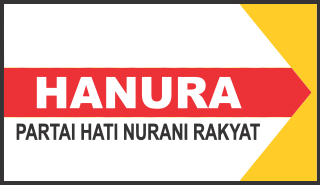
The People's Conscience Party is a political party in Indonesia. It was established following a meeting in Jakarta on 13–14 December 2006 and first headed by former Indonesian National Armed Forces commander Wiranto.
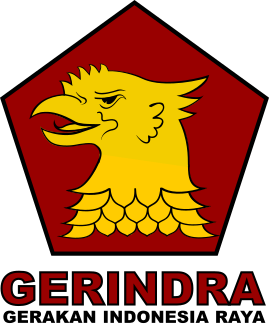
The Great Indonesia Movement Party is a political party in Indonesia. In the 2014 presidential election, the party was represented by former Indonesian Army Strategic Reserve Command and Indonesian special forces commander Lieutenant General Prabowo Subianto. Prabowo lost to Joko Widodo in the election, earning 46.85% of the vote to Widodo's 53.15%.

Presidential elections were held in Indonesia on 9 July 2014, with former general Prabowo Subianto contesting the elections against the governor of Jakarta, Joko Widodo; incumbent president Susilo Bambang Yudhoyono was constitutionally barred from seeking a third term in office. On 22 July the General Elections Commission announced Joko Widodo's victory. He and his vice president, Jusuf Kalla, were sworn-in on 20 October 2014, for a 5-year term.

Legislative elections were held in Indonesia on 9 April 2014 to elect 136 members of the Regional Representative Council (DPD), 560 members of the People's Representative Council (DPR) and members of regional assemblies at the provincial and regency/municipality level. For eligible voters residing outside Indonesia, elections were held on 5 or 6 April 2014 based on the decision of electoral commission of each different countries.

The General Elections Commission is the body that organises elections in Indonesia. Its responsibilities include deciding which parties can contest elections, organising the voting and announcing the results and seats won in the various branches of the government.

General elections will be held in Indonesia on 17 April 2019. For the first time in Indonesian history, the president, the vice president, and members of the People's Consultative Assembly (MPR), will be elected on the same day with over 190 million eligible voters. Sixteen parties will be participating in the elections nationally - with four participating for the first time.

Bambang Soesatyo is an Indonesian politician and businessman who is the current Speaker of the People's Representative Council. A member of Golkar Party, he was elected into the national legislative body in the 2009 elections. On 15 January 2018, Golkar selected him to replace Setya Novanto, who had resigned as parliament speaker amid a corruption investigation.

Local elections were held in Indonesia on 15 February 2017, with a single run-off for Jakarta on 19 April 2017. The series of elections was the second time local elections were held simultaneously across the country after the 2015 local elections. In total, the election contested 7 gubernatorial, 18 mayoral and 76 regent seats with 41 million eligible voters and 337 candidate pairs.

